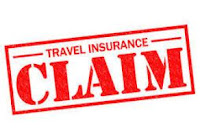To buy or not to buy. That is the question.
But for us, this is never a dilemma. We always
purchase travel insurance.
You wouldn’t drive a car or live in your home
without insurance, even though chances are you’ll never get back in claims
anywhere near what you’ve paid in premiums over the years. Yet you have it in
case that one catastrophic incident might happen.
So think about travel insurance the same way.
Because travel can be expensive, and the unthinkable can happen.
Our trip to India and Nepal last winter ended with my
husband Larry in the hospital in Kathmandu for eight days. Even though medical
expenses are less in Nepal than in the United States, we still racked up considerable
claims, not to mention canceling flights and rebooking last minute later on.
One thing to remember is that if there’s a medical
situation in a foreign country that requires prompt attention, you won’t be
able to get preapproval from your insurance company. So you may be required to
pay upfront (charge cards are generally accepted) and then receive reimbursement
from the insurance company after filing a claim when you get home. Just be sure
you have high enough limits to cover expenses.
What
does travel insurance cover?
The main reason to have it is to protect you from
financial losses if you must cancel or interrupt your trip for covered reasons
or you have legitimate medical expenses. It can also cover lost or stolen items
and provide financial assistance if flights are delayed or canceled or your
baggage is lost or delayed.
Cost is based on the age of the traveler, type of
coverage you choose, and cost of the trip. Generally the cost is around seven
percent of the amount of insurance you decide to purchase. It’s not always
necessary to purchase for the full amount since you only want to include
non-refundable expenses when calculating the trip cost (hotel or car rentals
may be cancellable, for example).
Policies are available that allow you to cancel for
any reason or that cover pre-existing conditions. These typically must be
purchased soon after your initial payment and will cost more than a standard
policy which can be purchased any time up until travel begins.For more information, check out these recommendations from Consumers Advocate (courtesy of Sam Klau).
What
is not covered?
Some policies will warrant against default by the
tour operator, but not all do. Also, there are restrictions on covered reasons
for canceling or interrupting the trip unless you purchased an all-inclusive policy.
When choosing a policy keep in mind the dollar limits for covered expenses.
One amount to look for is at least $150,000 for
emergency medical evacuation. With sufficient coverage on a regular travel
insurance policy, you don’t need to purchase a separate policy for this type of
emergency event.
Do
you have insurance from other sources?
Some home owner’s policies will cover lost items, including
luggage, although payment may not happen while you are traveling and need to replace items missing. And your
health insurance might pay for illness or accident expenses although Medicare usually
won’t cover expenses when traveling out of the country.
Some credit cards offer
travel insurance as a perk if you use the card to book certain expenses, or you
might have purchased insurance from the airline when booking your flights. Be sure to check
all possibilities, so you can then purchase only what is needed in excess of
what you already have. To help you analyze credit cards that are good for travelers, Money magazine offers its picks for best travel credit cards in 2020.
Bottom line is that—like any insurance—a travel
policy can provide valuable peace of mind. And reimbursement if unfortunate
circumstances happen.Images from free sites.








No comments:
Post a Comment